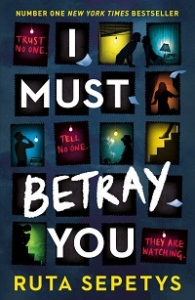Learning lessons from hidden history: an interview with Ruta Sepetys
Joy Court interviews Ruta Sepetys.
 The arrival of a new novel by Ruta Sepetys is an event for any reader who has encountered her extraordinary works of historical fiction. Yet, if it were not for the words of a perspicacious agent, it might all have been so different. Ruta had a Middle Grade, humorous detective novel ‘good to go,’ and just three pages written of what was to become her debut, Between Shades of Gray, only to be told that, while the first may sell, he could tell that her heart and passion were in Lithuania and that was the story she needed to tell. In fact, the seeds of her latest book, I Must Betray You, were sown on the promotional tour for Between Shades of Gray, when she first met and talked to people from Romania realising just how ignorant she was about the true story of the totalitarian regime under Ceauşescu and the rebellion which ended it. On a second visit, less than a year, later a young man asked if she would ever tell their story. She took that as a ‘vote of confidence’ from the Romanian people, ‘They had suffered so much, and nobody was talking about it.’
The arrival of a new novel by Ruta Sepetys is an event for any reader who has encountered her extraordinary works of historical fiction. Yet, if it were not for the words of a perspicacious agent, it might all have been so different. Ruta had a Middle Grade, humorous detective novel ‘good to go,’ and just three pages written of what was to become her debut, Between Shades of Gray, only to be told that, while the first may sell, he could tell that her heart and passion were in Lithuania and that was the story she needed to tell. In fact, the seeds of her latest book, I Must Betray You, were sown on the promotional tour for Between Shades of Gray, when she first met and talked to people from Romania realising just how ignorant she was about the true story of the totalitarian regime under Ceauşescu and the rebellion which ended it. On a second visit, less than a year, later a young man asked if she would ever tell their story. She took that as a ‘vote of confidence’ from the Romanian people, ‘They had suffered so much, and nobody was talking about it.’
There can be no doubt that the depth and quality of the research Ruta undertakes and the skill with which she deploys it, lifts her novels to Carnegie medal winning heights. Both Between Shades of Gray and Fountains of Silence were shortlisted and Salt to the Sea won the award in 2017. I learned that it was the seven long years of research into Spain under Franco for Fountains of Silence, that explains why I Must Betray You is only just appearing. Unlike the other novels set in Baltic regions, where she felt a closer connection to the culture and how the society worked, she had to start from scratch in Spain and she had to get it right. Her process always begins with extensive reading before she begins to speak to witnesses, ‘It would be inappropriate for me to expect them to educate me’, and her books always scrupulously list her sources and the reading she has done. But it is the witness accounts which are so crucial. She has to partner with true witnesses, ‘what right have I, to write a history that is not my own?’ What she is so passionate about is giving a voice to and telling the stories of those who have had no chance to do so. She was about to embark on a final trip to Romania for more witness interviews when COVID struck and sadly these last crucial interviews had to be conducted over Zoom.
What I found fascinating was learning how she creates the story from all these multiple sources and how she comes up with the characters who will tell the stories she has discovered. It was clear that I Must Betray You was always going to be young person’s story, because it was the brave Romanian students, to whom the book is dedicated, that sparked the rebellion. What is unusual for her is the first person, male perspective. But this felt almost inevitable after she had talked to so many adult males who described how helpless they felt at the time and how foolish afterwards, when they realised that the world in the smuggled American movies they watched, was not make-believe! The novel’s writing style is also markedly different. She wanted it to be sparse, reflecting being told that ‘even in young people’s dreams and even in private’, they did not feel able to express themselves freely and had a complete lack of trust. As she says in the author’s note ‘thoughts were rarely voiced aloud. Instead, they were imprisoned within an internal mental landscape’.
Christian is seventeen and this book reveals how he told his story, which is found in a metal box beside a grave. He is already a bit of a rebel,  with his spiky hair and love of poetry. He is full of questions, encouraged by his grandfather, Bunu. The role of grandparents was another common thread from the interviews, that they were the brave generation who knew the world beyond the borders and tried to overcome the brainwashing. Christian is blackmailed by an agent of the feared Securitate into spying on the American diplomat’s family, where his mother cleans, in return for medicine for Bunu’s leukaemia. He thinks he can do this while secretly betraying the regime in his hidden journal, but as Securitate reports interspersed into the text reveal, they are watching his every step. The tension and danger rapidly mounts as the Iron Curtain crumbles everywhere, except Romania, until young people take to the streets ‘armed with nothing but courage’.
with his spiky hair and love of poetry. He is full of questions, encouraged by his grandfather, Bunu. The role of grandparents was another common thread from the interviews, that they were the brave generation who knew the world beyond the borders and tried to overcome the brainwashing. Christian is blackmailed by an agent of the feared Securitate into spying on the American diplomat’s family, where his mother cleans, in return for medicine for Bunu’s leukaemia. He thinks he can do this while secretly betraying the regime in his hidden journal, but as Securitate reports interspersed into the text reveal, they are watching his every step. The tension and danger rapidly mounts as the Iron Curtain crumbles everywhere, except Romania, until young people take to the streets ‘armed with nothing but courage’.
It is certainly sobering to realise the incidents which these fictional characters experience and the deprivations of daily life under the regime are all true. When you come to read the banana shampoo incident, try to remember that this was related to Ruta by an adult, male, diplomat! But more heartbreakingly, ‘some stories were simply too horrific to use’. There seems an almost alchemical skill in the way she can weave so many personal stories into an unforgettable narrative, without ever resorting to the dreaded ‘info dump’. If there is information the reader needs, she writes a scene to reveal it naturally. She often sketches out scenes and snippets of dialogue after an interview has concluded, which will be used later the writing process. What she also does superbly is juxtapose the light with the dark, in the same way perhaps that the whispered jokes they told helped the Romanian people endure the hardships. She is apparently classed as a Romance author in Italy and whilst this may seem bizarre, in all her novels there are nuanced relationships, there is love and humour and the full spectrum of the human condition. Christian and his friends are teenagers falling in love, even if they have to turn on taps to hide their conversations and carry out their illicit Coca Cola drinking in dark alleys.
Another truth she felt compelled to covey is that Romania had no clear or satisfying ending to this traumatic period. Questions still remain and she has tried to reflect this in the epilogue. Ruta acknowledges this may feel frustrating to the reader, but remarks that not getting answers is far worse for the people who lived through these events. The witnesses she spoke to were adamant, ‘You cannot tie this up in a bow’.
While a war rages in Eastern Europe and a regime is trying to control the news story its citizens receive, it seems all the more important to read novels like this which ‘shine a light in dark corners of the past.’ Discovering the horrors of Ceauşescu’s fertility tyranny while women’s reproductive autonomy is currently threatened by the potential removal of the Roe vs Wade judgement in the USA, does make one think that, as Ruta says ‘If history remains forgotten then lessons are never learnt’.
This compulsively readable, insightful and unmissable novel is available now in ebook and audio but publishing in print here in the UK in August.
I Must Betray You is published by Hodder Children’s Books, 978-1444967616, £6.99 pbk
Joy Court is a trustee of The United Kingdom Literacy Association (UKLA), co-founder of All Around Reading and Conference Manager for CILIP Youth Libraries Group. She is a Past Chair of the CILIP Carnegie and Kate Greenaway Medals.



